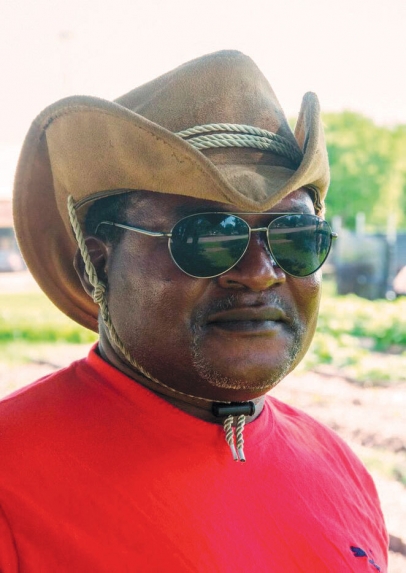Planting a Future, One Farmer at a Time
From refugee to urban farmer
A solidly built man in work boots walks rows of dark leafy kale, pepper plants, tomatoes, squash and beans near one of those impossibly overbuilt Houston intersections dominated by heavy traffic, signs and concrete. The small urban farm is easy to miss, and litter blows around a nearby bus stop, marring the view. But there is something hopeful in the presence of things growing, satisfying as the first bite of a just-picked pepper or a fistful of string beans.
Growing numbers of refugees are coming to Houston. Growing appreciation for local, organic food is helping to make urban farm cultivation a reality.
Here at the edge of Sharpstown, the two trends converge like flavors meant for each other. Guy Mouelet, a farmer who fled with his family from violence in his home country of Congo-Brazzaville in Central Africa, hopes to earn a living wage tending these vegetables, while at the same time expanding Houston’s supply of locally grown organic food.
The concept was conceived by a Houston-based nonprofit group called Plant It Forward. “Our vision is a farm in every neighborhood,” says Teresa O’Donnell, its executive director.
Mouelet and other refugees from Plant It Forward often come to the U.S. with experience growing and harvesting their own food, but because of language and cultural barriers, they often need assistance when it comes to navigating the business world and selling the literal fruits of their labors. The nonprofit provides land, tools and training for a period of about a year. Connections are made with chefs, community-supported agriculture groups and local farmers markets, and eventually the student farmers are ready to operate independently.
Mouelet is harvesting and selling his first crop this spring, with a long-term goal of owning a restaurant that utilizes the produce he grows.
“I want to cook the fresh food for the people,” he says, speaking French to a fellow farmer/interpreter. “I want this farm to be a big farm and feed many people in Houston, and even outside the state.”
In the meantime, Mouelet works at a restaurant then comes several hours each day to tend his crops in a vacant lot owned by a church. Mouelet is awaiting an irrigation system. But he says he doesn’t mind hand-watering. “I’m happy to do it, he says. “It makes me see every plant, how it grows.”
Mouelet and other Plant It Forward farmers follow seasonal planting guidelines for Houston. He covers each row of vegetables with a blanket of chopped leaves. The covering keeps weeds from surfacing, moderates soil moisture and will improve soil fertility over time, he says.
Like so many places in Houston, the sound of the freeway is never far away when Mouelet walks his fields. But his attention is typically fixed on the seedlings and mature plants that cover this once empty lot, crops that represent so much more than a farmers market offering. “I am focused on the farm. It is our future.”
> Learn more about the farms and farmers at Plant It Forward by visiting plant-it-forward.org.
Julie Bonnin lives, writes and gardens in far north Houston. She is grateful for opportunities to cook with herbs, homegrown fruits and vegetables; to harvest rainwater, tend a compost pile and observe nature–and does so as much as possible





